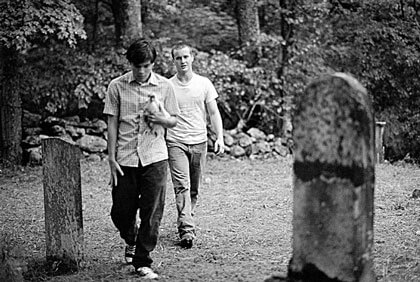Tender, poignant coming of age gay boy flick hits the right notes
A sensitive and moving drama, “The Mudge Boy” deals with a young man in the heartland coming to terms with both his homosexuality and his grief for his recently deceased mother. This heartfelt film, written and directed by Michael Burke, is an unexpected gem—filled with fine performances and artfully composed images. What is more, this quietly observed character study packs an intense emotional wallop.
Emile Hirsh stars as Duncan, a gawky teenager whose best friend is his pet chicken. He is derided by other kids as “The Chicken Boy,” and has few friends in his rural community. He also has trouble connecting with strict father (Richard Jenkins) who himself is preoccupied by the loss of his wife. This tension between the two grieving men is complicated by Duncan’s efforts to keep the memory of his mother alive—by wearing her robes—but his father shames him for this behavior.
Meanwhile, Duncan strikes up a friendship with Perry (Thomas Guiry), a strapping young farmhand who has an overactive sex drive and an abusive father. As the boys bond, swimming in the local river and sitting around talking in the farm fields, Perry helps the timid Duncan come out of his shell.
At one point, Duncan shows Perry a secret—how he can calm a chicken by putting its head in his mouth. The sexual imagery of this is not lost on Perry who later uses his innocent friend’s unspoken attraction to him as a means to an end. When Perry is interrupted getting a blowjob from a local girl, he enlists Duncan—who spied this activity—to finish him off. It is in this riveting scene that “The Mudge Boy” is particularly stunning. Burke fully explores his story’s themes about masculinity, sexuality, and desire to remarkable effect.
Significantly, Perry, who acts as the catalyst for his friend’s maturation, seems to have as many demons as Duncan does. One of the film’s strengths is the way these two very different young men seem to be coping with their respective crises of impending manhood. While Perry overcompensates for his insecurities by protecting Duncan when his friend is teased—Perry beats up a guy who insults his friend—Duncan is quiet and effeminate, unable to fully comprehend or express his thoughts and feelings as his sexuality blossoms.
Duncan’s coming of age is poignantly expressed when he succumbs to the peer pressure of Perry’s friends. These boys use Duncan’s money to buy beer and then proceed to get him drunk and make him act foolish for their amusement. Burke captures these moments without sentimentality, making them painful, if astutely observed episodes.
“The Mudge Boy” benefits tremendously from Emile Hirsch’s magnificent portrayal of Duncan. It is perhaps the young actor’s best screen role to date. Hirsch communicates the fear and confusion Duncan faces without making him pathetic. Hirsch’s every gesture—from his wide-eyed innocence and hesitant speech to his gawkiness and awkward way of running—is extraordinary. His smile when he thinks he belongs is as powerful as the look of terror in his eyes when his pet chicken is threatened.
Hirsch is ably supported by Richard Jenkins, who, with few words, expertly conveys the anger and rage a father feels seeing his son in his late wife’s clothes—and the unavoidable realization that he might be gay.
Thomas Guiry is sexy and impressive as Perry. Guiry, who adopts a cocky swagger to match his macho personality, is alluring when he delivers a speech about having sex with a woman, and frightening when his pent-up anger explodes in an act of violence.
Featuring unusual but realistic characters, “The Mudge Boy” is an outstanding drama, and one that deserves to be seen.


































